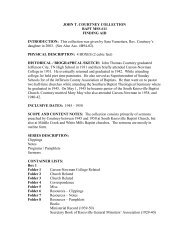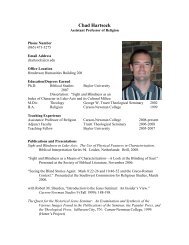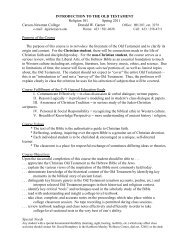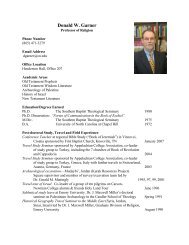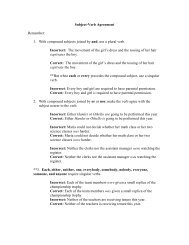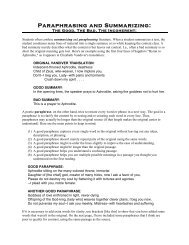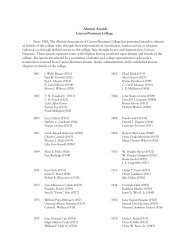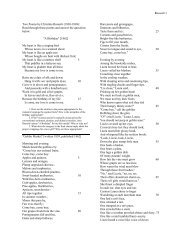a comparative analysis of louis durey and francis poulenc's settings ...
a comparative analysis of louis durey and francis poulenc's settings ...
a comparative analysis of louis durey and francis poulenc's settings ...
Create successful ePaper yourself
Turn your PDF publications into a flip-book with our unique Google optimized e-Paper software.
12<br />
c. Francis Poulenc (1899-1963)<br />
Francis Poulenc was born in Paris on January 7, 1899. His father Emile was a<br />
chemical manufacturer. His parents both had a love for the arts. His mother, Jenny,<br />
played the piano <strong>and</strong> his father was a music admirer. His parents never missed opening<br />
night at the opera house. Poulenc’s mother taught him how to play the piano when he was<br />
a child. He was considered a prodigy <strong>and</strong> eventually studied with Ricardo Viñes, a<br />
Spanish virtuoso pianist, who introduced him to Erik Satie <strong>and</strong> Georges Auric. Viñes had<br />
a pr<strong>of</strong>ound musical impact on Poulenc <strong>and</strong> “contributed heavily to the formation <strong>of</strong><br />
Poulenc’s taste as well as his piano technique.” 28<br />
Poulenc began composing in 1917 when it was popular to set Negro texts to<br />
music. His first composition, Rhapsodie Nègre, brought him overnight success in the<br />
Parisian music scene. That same year, Poulenc was summoned to join the army <strong>and</strong><br />
served in the antiaircraft unit until October 1921. He made several trips back <strong>and</strong> forth to<br />
Paris <strong>and</strong> composed several pieces while serving in the army. In 1919, Poulenc was<br />
introduced to the illustrated version <strong>of</strong> Guillaume Apollinaire’s Le Bestiaire poetery.<br />
Poulenc decided to set a number <strong>of</strong> the poems to music, inciting a deep admiration for<br />
Apollinaire’s poetry.<br />
Around this time, Poulenc began to identify with Les Six. He benefited greatly<br />
from his friendship with the other composers in the group, although he differed from<br />
them artistically. After his ballet Les Biches received favorable review in 1924, he split<br />
from Les Six, due to personal conflict with Erik Satie. Over the next several years,<br />
Poulenc composed a variety <strong>of</strong> works for various instruments. He turned to Apollinaire<br />
<br />
28 Vivian Wood. Poulenc’s Songs: An Analysis <strong>of</strong> Style. (Jackson: University Press <strong>of</strong> Mississippi, 1979),<br />
11.



